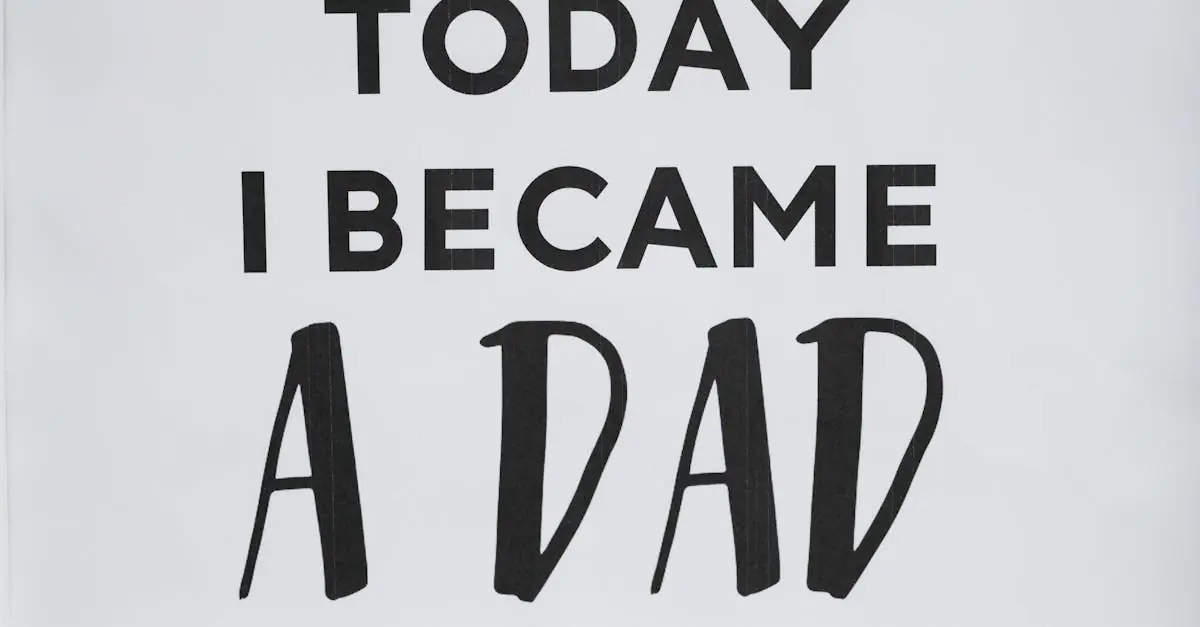Navigating the world of adoption can feel like trying to solve a Rubik’s Cube blindfolded. One crucial piece of that puzzle is the letter to birth parents. This heartfelt note isn’t just a formality; it’s a bridge between two worlds, filled with emotions, questions, and a sprinkle of hope.
Imagine crafting a letter that not only shares your journey but also opens a door to understanding and connection. It’s an opportunity to celebrate the past while embracing the future. Whether it’s a heartfelt message or a lighthearted anecdote, these letters can pave the way for meaningful relationships. So grab your favorite pen and let’s dive into the art of writing letters that resonate, inspire, and maybe even bring a smile to someone’s face. After all, who wouldn’t want to receive a letter that warms their heart and makes them chuckle?
Table of Contents
ToggleUnderstanding Letters to Birth Parents
Letters to birth parents play a crucial role in the adoption journey. These personal messages create lasting connections and convey deep emotions between families.
Purpose of Letters
Creating a letter serves multiple purposes. It offers insight into the adoptive family’s life and highlights values and hopes for the child’s future. Sharing anecdotes can paint a picture of everyday moments, making the content relatable. These letters often express gratitude, acknowledging the birth parents’ courage and love. They allow adoptive parents to communicate their commitment to raising the child in a nurturing environment. Ultimately, this correspondence fosters a sense of unity and understanding.
Importance of Communication
Communication acts as a bridge between adoptive and birth families. Establishing open lines fosters trust and encourages honesty, essential for navigating the complexities of adoption. Regular updates about the child’s milestones can help birth parents feel connected to their child’s life. Many adoptive parents find that sharing these moments alleviates uncertainty, enriching both parties’ experiences. Prioritizing consistent dialogue cultivates a supportive relationship, promoting emotional well-being for everyone involved.
Writing Tips for Letters to Birth Parents
Crafting a letter to birth parents takes care and thoughtfulness. This letter should reflect genuine feelings while fostering connections.
Choosing the Right Tone
Selecting the appropriate tone sets the stage for effective communication. Using a warm and respectful voice conveys understanding and appreciation. Consider personalizing the letter; each relationship is unique. Balance sincerity with positivity to create an inviting atmosphere. Avoid overly formal language, as it may create distance. Expressing emotions openly helps build trust, allowing birth parents to feel connected to the adoptive family.
Sharing Personal Stories
Sharing personal stories creates intimacy and relatability. Highlight significant moments from the adoptive family’s journey, like milestones and everyday experiences. Specific anecdotes can illustrate values and parenting styles effectively. These narratives give birth parents a glimpse into the life their child is becoming a part of. Including stories about the child’s interests or family traditions can also strengthen the emotional bond. By connecting on a deeper level, these stories promote understanding and reassurance for birth parents.
What to Include in Letters
Letters to birth parents should carry heartfelt and meaningful content. Thoughtfully crafted details create a deeper connection between adoptive and birth families.
Information About the Adoptive Family
Share the family’s story. Discuss daily life, highlighting routines and activities. Include details about family members, such as parents’ occupations and children’s ages. Present insights into values, traditions, and interests. Mention hobbies that define family life—travelling, gardening, or sports. These components paint a vivid picture of the environment the child will join. It’s essential to convey an atmosphere filled with love and stability. Birth parents will appreciate understanding their child’s future setting.
Messages of Love and Support
Communicate gratitude. Express appreciation for the birth parents’ decision, which significantly impacts the child’s life. Share specific promises, demonstrating commitment to raising the child with care and respect. It’s beneficial to reassure birth parents of their importance in the child’s story. Illustrate ongoing connections and updates as the child grows, fostering bonds between families. Affirm the child’s inclusion in family traditions, emphasizing ongoing affection and support. Messages of love create meaningful connections, reassuring birth parents that their choice leads to a nurturing future.
The Impact of Letters on Birth Parents
Letters to birth parents create profound emotional connections and foster understanding in the adoption journey. These letters serve multiple purposes, significantly affecting birth parents’ emotional well-being and identity.
Emotional Response and Healing
Letters often spark a deep emotional response in birth parents, leading to a sense of healing. When they read messages that express gratitude and affection, feelings of reassurance emerge. Birth parents gain insight into their child’s life, which helps alleviate worries about their decision. Each thoughtful word reinforces their positive impact on the child’s future. Healing occurs as adoptive parents share their commitment to nurture and support the child’s growth. This connection allows birth parents to recognize their role in a loving environment, promoting emotional stability for all involved.
Building Connections
Building connections between birth parents and adoptive families enhances the overall adoption experience. Letters serve as a bridge, establishing trust and openness. Sharing family stories, traditions, and milestones invites birth parents into the child’s life. This communication fosters an ongoing relationship, one grounded in shared values and care. Frequent updates regarding the child’s progress create a feeling of inclusion, making birth parents feel valued. By prioritizing these connections, adoptive families reaffirm their commitment to transparency and support, ensuring emotional fulfillment for both parties.
Conclusion
Writing letters to birth parents is a powerful way to build connections and foster understanding in the adoption journey. These letters not only convey gratitude and commitment but also create a bridge that nurtures trust and openness between families. By sharing personal stories and updates, adoptive parents can reassure birth parents of their child’s loving environment.
The emotional impact of these letters extends beyond mere communication. They provide healing and reassurance for birth parents, allowing them to feel involved in their child’s life. Ultimately, thoughtful and heartfelt letters enrich the adoption experience for everyone involved, promoting emotional well-being and lasting relationships.




